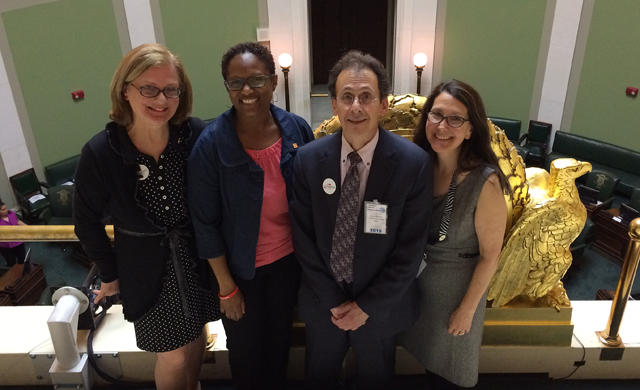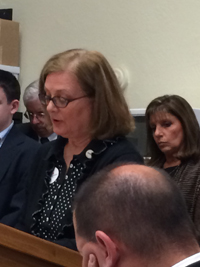AARP Eye Center
Testimony by Enzo Pastore, AARP Government Affairs

AARP Rhode Island Testimony
SB 481
CAREGIVER ADVISE RECORD AND ENABLE ACT
Senate Committee on Health & Human Services
Thursday, April 30, 2015
Good afternoon Chairperson Miller and members of the Health and Human Services Committee. My name is Enzo Pastore. I am a Senior Legislative Representative in AARP’s Government Affairs Department in Washington, D.C. I am grateful for the opportunity to appear before you today and share AARP's strong support of Senate Bill 481 as amended by Senator Goldin.
Let me say at the outset that we have been working very closely and cooperatively with Donna Policastro of the American Nurses Association in making changes to Senate Bill 481 and I’m glad to report that we are in agreement with the language and all the provisions of the amended bill as was just introduced by Senator Goldin.
AARP is a nonpartisan, social mission organization with an age 50+ membership of nearly 37 million nationwide, and approximately 130,000 members here in Rhode Island. AARP fights for issues that matter most to families such as healthcare, family caregiving and independent living.
Over the past several years, AARP has focused its attention, resources and commitment in support of family caregivers. And by family caregivers I mean — spouses, partners, relatives, even friends or neighbors, people who have a significant relationship with and provide unpaid care for a loved one.
A 2012 “Home Alone” report, a national survey conducted by AARP’s Public Policy Institute and the United Hospital Fund, found that among the more than 1,600 family caregivers surveyed, nearly half (46 percent) reported performing medical and nursing tasks for care recipients with multiple chronic physical and cognitive conditions. These tasks include managing multiple medications, providing wound care, preparing food for special diets, using monitors, and operating specialized medical equipment. These tasks were in addition to the assistance provided with bathing, dressing, eating, and household tasks. Because of these findings, it is evident that the role of family caregivers has expanded dramatically to include performing medical and nursing tasks of the kind and complexity once provided only by hospitals, nursing homes and home care providers. And for which family caregivers have received little to no training.

Family caregivers carry a huge responsibility. According to AARP’s Public Policy Institute, at any time during the year, an estimated 148,000 Rhode Island caregivers step up to provide 142 million hours of care for an aging parent or loved one, helping them to live independently in their own homes. Based on this 2009 data, the care that these family caregivers provide is valued at nearly $1.9 billion per year. And that’s billion with a B.
As we have done in the past, we at AARP would like to offer our highest praise to the Rhode Island Legislature for your collective wisdom and leadership in enacting both the Family Caregivers Support Act of 2013 followed immediately by another legislative milestone in 2014, when Rhode Island became only the third state in the nation to establish a Temporary Caregiver Insurance program, providing working caregivers with the means to care for a beloved family member.
We also applaud Chairman Miller’s vision and leadership with the 2014 passage of SB 2801, which recognizes the value of a comprehensive hospital discharge plan and acknowledges that the transition process from hospital to home is a critical time in a patient’s recovery.
Chairman Miller, we are in full agreement with your thinking and intent when it comes to improving hospital discharge policies. And in that spirit, Senate Bill 481, the CARE Act (Caregiver Advise, Record and Enable) will advance some simple, common sense steps that would make a world of difference to family caregivers. The first step is that upon admission, a hospital would provide patients with the opportunity to designate a caregiver and have that caregiver’s contact information entered into the patient’s medical record.
This designation will allow the family caregiver to receive timely information that can allow him/her to better provide post-discharge care. By including the designation in the medical record, it shows that the caregiver is valued and it establishes an avenue by which the hospital can share important information.
Step 2 of SB 481 calls on the hospital to notify and alert the family caregiver if his/her loved one is being discharged home or transferred to another facility. By providing the caregiver with this timely information the caregiver can better coordinate and manage the transition from one care setting to another.
Step 3 of SB 481 creates a framework for hospitals to, prior to the patient’s discharge, provide the family caregiver with instructions on how to perform after-care medical and nursing tasks that the patient will need once they return home. Rather than leaving it up to the family caregiver to learn how to perform these after-care tasks on their own, we believe creating this framework will lead to providing patients with better care.
Chairman Miller and Committee members, I would also point out that we believe that SB 481 carries no fiscal impact to the State.
AARP recognizes the critical role family caregivers play in keeping their loved ones out of costly institutions. We believe these bills put into place some small, but meaningful supports for family caregivers during their loved one’s transition from hospital to home, a difficult and stressful time for both patients and caregivers.
As caregivers are better informed, notified, and instructed in after-care tasks, they have a better chance to keep their loved ones safely at home. AARP asks you to support Senate Bill 481. To do so means you are joining your legislative colleagues who to date, have enacted CARE Act legislation in New Jersey and 6 other states and which await the signatures of their respective Governors in three additional states.
Again, thank you for allowing me the opportunity to testify today and I am happy to take any questions you may have.
Submitted by,
Enzo Pastore, MSS, MLSP
Senior Legislative Representative
AARP Government Affairs

#AARPRI
The CARE Act -- Where AARP Stands
Testimony submitted by volunteer Ruth Bucci, North Providence
April 28, 2015
Senator Joshua Miller, Chair
Senate Committee on Health & Human Services
Rhode Island General Assembly
Providence, RI
Dear Chairman Miller and Members of the Health & Human Services Committee:
I am a volunteer for the AARP and support the CARE Act (SB481). The CARE Act is important because it can help caregivers know how to provide assistance to their loved ones.
I was also a caregiver for my parents and my mother-in-law. My father suffered from a lung disease and life for him became very difficult since he had great difficulty breathing and he had fluid retention, could not walk to the bathroom, and required assistance in his daily life. One sad episode occurred when I took my father to the Veterans Hospital. As I wheeled Dad in his wheel chair down the hospital corridor, I noticed that he was leaving fluid. I was very upset because I did not know what to do. Thankfully, a hospital staff saw my difficulty and said that he would help and he took Dad into a room and solved the bladder problem for the time being.

My mother suffered with liver cancer and underwent chemotherapy for several years. After each treatment, Mom returned home and my family and I tried to make her as comfortable as possible, her life as good as we could make it, with home cooked plain food in small quantity and company. The last chemotherapy resulted in Mom requiring great assistance in her daily bodily functions and made my mother’s last conscious days very difficult. Had there been a more thorough discussion with the physician about the effects of that last treatment, Mom might have had an easier death. Several days after that last treatment, Mom lapsed into a coma and passed away with her family there for her.
My mother-in-law spent her last month in her apartment with my husband and myself as her caretakers. Her husband, my father-in-law, had passed just a few months prior to my mother-in-law being rushed to Miriam Hospital and receiving the terminal diagnosis of stomach cancer. As my husband and I tried to get further treatment for my mother-in-law from the hospital, we were told, “You’re just prolonging it.” I had to threaten an appeal to get one more day of hospital care. Then we were advised to send my mother-in-law to a Hospice Center. We refused. We were told that we could not take proper care of her but we said that we would move in with her to care for her and we did. Hospice nurses visited and helped us. Changing bandages, bathing my mother-in-law’s legs and administering morphine when needed were part of my job. More support from hospital staff might have been helpful.
The CARE Act may allow greater dignity for patients by allowing their caretakers more instruction about taking care of very sick patients at home.
Sincerely yours,
Ruth Bucci
Testimony filed on behalf of volunteer Ruth Thumbtzen, Newport
The Honorable Joshua Miller
Chairman
Senate Health and Human Services Committee
State House
Providence, RI 02903
Dear Chairman Miller and Members of the Health and Human Services Committee:
I am a volunteer for AARP Rhode Island. I am writing to you to express my support for the CARE Act (SB 0481). The Act calls for a hospital to notify and meet with the designated caregiver to discuss a patient’s care prior to being discharged from a hospital.
I know the benefits of being properly trained to be an effective and strong caregiver. For a while, I was the primary caregiver for my mom. Being the only one of her four children in the area, I was the one who had to make all the decisions. I had to ensure that I gave her the best care possible. It changed my daily life and routine.

When I took my mom home from the hospital, I would have appreciated an after-care plan. It would have given me an opportunity to ask questions and view a live demonstration of the key tasks I was required to perform. My mom unfortunately had a stroke, and she went from the hospital to an assisted living facility, and then to a nursing home.
This is why I support the CARE Act including the section that designates a hospital staff member to brief the caregiver on community resources, long-term services and other support options. I urge lawmakers to enact the CARE Act to ensure family caregivers receive the support and information they need to care for people who are returning home after a stay in the hospital.
Sincerely,
Ruth Thumbtzen

May 6, AARP testimoney before the Rhode Island House Finance Committee, recommending passage of the the CARE Act. AARP Senior Legislative Representative Enzo Pastore's testimony begins at 12:30 into the video; volunteer Ruth Bucci's testimony comes at 26:20.























































